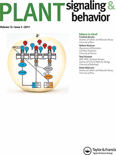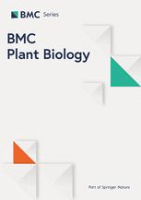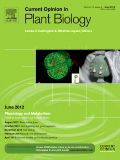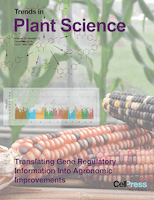
PROTOPLASMA
Scope & Guideline
Transforming Research into Knowledge for Future Generations
Introduction
Aims and Scopes
- Cellular and Molecular Biology of Plants:
Research that delves into the cellular structures, functions, and biochemical processes in plants, including studies on organelles, cellular responses to stress, and developmental biology. - Plant Physiology and Stress Responses:
Investigations into how plants respond to various abiotic stresses such as drought, salinity, and temperature, including metabolic and physiological adaptations. - Plant Development and Morphogenesis:
Studies focusing on the developmental processes in plants, including embryogenesis, organogenesis, and the regulation of growth patterns. - Ecological Interactions and Plant-Microbe Relationships:
Research exploring the interactions between plants and their environments, including symbiotic relationships with microorganisms and the ecological implications of these interactions. - Histological and Ultrastructural Analyses:
Detailed examinations of plant tissues and cellular structures using histological and ultrastructural techniques to understand their roles in functionality and adaptation. - Genomics and Molecular Genetics:
Research involving genome-wide analyses, gene expression studies, and molecular genetics to uncover the genetic basis of plant traits and responses.
Trending and Emerging
- Omics Approaches in Plant Biology:
There is a notable increase in studies utilizing genomics, transcriptomics, and proteomics to explore complex biological processes in plants, highlighting the integration of high-throughput technologies. - Plant-Microbe Interactions:
Research focusing on the interactions between plants and microorganisms, particularly beneficial microbes, is gaining attention due to its implications in sustainable agriculture and ecosystem health. - Stress Physiology and Resilience Mechanisms:
An increasing number of studies are addressing how plants cope with environmental stresses, particularly in the context of climate change, emphasizing resilience mechanisms and adaptive strategies. - Cellular and Molecular Mechanisms of Regeneration:
Emerging research is exploring the cellular and molecular bases of plant regeneration and repair mechanisms, reflecting a growing interest in understanding how plants recover from damage. - Biotechnological Applications and Innovations:
Research that applies biotechnological approaches to improve crop traits, including stress tolerance and yield, is trending as agriculture seeks to adapt to changing environmental conditions.
Declining or Waning
- Traditional Morphology:
Research centered on classical morphological descriptions of plants has seen a decline, possibly due to the shift towards molecular and genetic approaches that provide deeper insights into plant biology. - Generalized Ethnobotany:
Studies that focus broadly on the traditional uses of plants without rigorous scientific methodologies are less frequently published, reflecting a move towards more scientifically rigorous ethnobotanical research. - Basic Phytochemical Analyses:
While phytochemistry remains important, the focus has shifted from basic analyses to more complex studies involving metabolic pathways and genetic regulation of phytochemical production. - Taxonomic Studies Without Molecular Support:
Taxonomic research that does not incorporate molecular data or modern techniques is becoming less common, as molecular phylogenetics provides more accurate classifications.
Similar Journals

Plant Signaling & Behavior
Bridging Science and Nature: The Language of PlantsPlant Signaling & Behavior is a prestigious journal published by TAYLOR & FRANCIS INC, dedicated to advancing the understanding of the complex signaling mechanisms and behavioral responses of plants. With an ISSN of 1559-2316 and an E-ISSN of 1559-2324, it has firmly established itself in the field of Plant Science, earning a Q1 ranking in the 2023 category quartiles and ranking #83 out of 516 in Agricultural and Biological Sciences, placing it in the 84th percentile according to Scopus metrics. The journal serves as a vital platform for researchers and professionals looking to publish innovative studies and reviews that explore the intricate relationships between plant behavior and environmental signaling. With coverage spanning from 2006 to 2024, Plant Signaling & Behavior not only enhances academic discourse but also supports the growing interdisciplinary nature of plant sciences. Although the journal is not open access, it remains a significant resource for students, researchers, and practitioners aiming to deepen their understanding of plant signaling and its implications for ecology and agricultural practices.

Cytology and Genetics
Advancing Knowledge in Cytology and GeneticsCytology and Genetics is an esteemed academic journal published by PLEIADES PUBLISHING INC, dedicated to advancing research within the fields of cytology, cellular biology, and genetics. Since its inception in 1978, the journal has served as a platform for disseminating innovative findings and methodologies pertinent to contemporary biological sciences. With an ISSN of 0095-4527 and an E-ISSN of 1934-9440, Cytology and Genetics offers critical insights that significantly contribute to the current understanding of genetic mechanisms and cellular processes. Despite its present positioning in the Q4 quartile across multiple categories, including Agricultural and Biological Sciences and Cell Biology, the journal remains a crucial resource for emerging researchers seeking to explore complex genetic and cytogenetic landscapes. With an emphasis on empirical studies and comprehensive reviews, the journal aims to bridge gaps in knowledge and foster collaboration among scholars in the United States and beyond. As a vital tool for students, professionals, and researchers, Cytology and Genetics invites contributions that reflect the future of genetics and cytological science.

Current Plant Biology
Pioneering Research for a Greener FutureCurrent Plant Biology is a distinguished peer-reviewed journal published by ELSEVIER, focusing on the dynamic and rapidly evolving field of plant sciences. Since its inception as an Open Access publication in 2014, it has established itself as a leading platform for innovative research, boasting a remarkable Impact Factor that underscores its relevance and contribution to the scientific community. Based in the Netherlands, this journal caters to a diverse audience of researchers, professionals, and students, facilitating the dissemination of key findings in an array of disciplines including biochemistry, genetics, cell biology, and developmental biology. Recognized for its rigorous standards, Current Plant Biology holds a prestigious standing, classified within the Q1 and Q2 quartiles of various Scopus categories, reflecting its impact and reputation in the realms of Plant Science and related fields. The journal is committed to providing accessible and high-quality research outputs that inspire further investigation and collaboration in plant biology.

BMC PLANT BIOLOGY
Exploring the Depths of Plant Science KnowledgeBMC Plant Biology, published by BMC, is a leading open-access journal devoted to the field of plant science, presenting high-quality research that contributes significantly to the understanding of plant biology. Since its inception in 2001, the journal has established itself as a prominent platform for disseminating innovative research, achieving a commendable Q1 ranking in Plant Science within the 2023 Scopus quartiles, and ranking #39 out of 516 journals in the Agricultural and Biological Sciences category, indicating its substantial impact with a 92nd percentile ranking. Researchers, professionals, and students engaged in the study of plant biology will find a wealth of knowledge in its comprehensive scope, covering critical areas such as molecular biology, genetics, ecology, and biotechnology. The journal's commitment to open access ensures that cutting-edge research is available to a global audience, fostering collaboration and advancement in the field. BMC Plant Biology continues to inspire and facilitate growth in plant-related studies, making it an invaluable resource for anyone interested in the vibrant and essential domain of plant science.

JOURNAL OF PLANT RESEARCH
Bridging Research and Application in Plant Science.JOURNAL OF PLANT RESEARCH, published by SPRINGER JAPAN KK, is a leading academic journal that has carved a niche in the field of Plant Science. With its ISSN 0918-9440 and E-ISSN 1618-0860, this journal has been disseminating high-quality research since its inception in 1993 and continues to be essential reading for academics and practitioners alike, aiming to bridge the gap between innovative plant research and practical applications. The journal is highly regarded, holding a prestigious Q1 ranking in Plant Science for 2023, and is positioned in the top 80th percentile within the Scopus rankings for Agricultural and Biological Sciences. The journal's coverage includes a wealth of topics pertinent to advancing our understanding of plant biology, ecology, and sustainable agricultural practices. Although it operates under a subscription model, its influence in the research community remains profound, making it a vital resource for contemporary studies in plant-related disciplines.

Frontiers in Plant Science
Fostering breakthroughs in plant physiology and ecology.Frontiers in Plant Science is a premier open-access journal dedicated to advancing the understanding of plant biology, covering a broad spectrum of topics including physiology, ecology, and biotechnology. Published by FRONTIERS MEDIA SA in Switzerland, this journal has established itself as a key resource in the field of plant science, boasting an impressive impact factor and ranking in the Q1 category for plant science as of 2023. With its Scopus rank of 61 out of 516 in both Agricultural and Biological Sciences, the journal is recognized for its quality and relevance, being in the 88th percentile among its peers. Since its inception in 2010, Frontiers in Plant Science has embraced an open-access format, ensuring that cutting-edge research is readily available to scientists, professionals, and educators around the globe. The journal aims to foster innovative research and collaboration within the plant science community, making it an essential publication for those looking to stay at the forefront of the discipline.

Nature Plants
Transforming Plant Science Through Groundbreaking DiscoveriesNature Plants is a premier journal dedicated to the dynamic and interdisciplinary field of plant science, published by NATURE PORTFOLIO in the United Kingdom. With an impressive impact factor placing it in the top tier of scholarly journals—ranking Q1 in Plant Science for 2023—this journal sets a high standard for research dissemination. Nature Plants has maintained a remarkable Scopus Rank of 5 out of 516 in the Agricultural and Biological Sciences category, reflecting its pivotal role in advancing knowledge in the field. The journal aims to provide a platform for groundbreaking research that addresses key challenges in plant biology, ecology, and agriculture, thereby fostering a deeper understanding of plant science's contribution to global sustainability. Although primarily non-open access, it offers exclusive insights and robust discussions, making it an indispensable resource for researchers, professionals, and students eager to explore the latest advancements and innovations in plant science.

CURRENT OPINION IN PLANT BIOLOGY
Shaping Tomorrow's Understanding of Plant SystemsCURRENT OPINION IN PLANT BIOLOGY is a premier academic journal published by CURRENT BIOLOGY LTD, dedicated to providing comprehensive insights and critical analyses on the latest advancements in the field of plant science. Established in 1998 and with a circulation slated until 2024, it holds an impressive Q1 ranking in the prestigious plant science category, reflecting its significant contribution to the discipline. With a Scopus rank of #11 out of 516, the journal is positioned in the 97th percentile, underscoring its influential role in shaping contemporary research. Although it does not offer open access, the journal provides valuable information that is essential for researchers, professionals, and students alike. The ISSN for this influential journal is 1369-5266, and its online presence is marked by the E-ISSN of 1879-0356. As a critical platform for the exchange of ideas and cutting-edge findings in plant biology, CURRENT OPINION IN PLANT BIOLOGY continues to be a vital resource for those looking to advance their understanding of plant systems and innovations across agricultural and biological sciences.

TRENDS IN PLANT SCIENCE
Connecting Ideas, Cultivating KnowledgeTRENDS IN PLANT SCIENCE is a premier academic journal published by CELL PRESS, dedicated to advancing the field of plant sciences. With an ISSN of 1360-1385 and E-ISSN 1878-4372, this journal has established itself as a critical resource for researchers and practitioners alike, boasting a remarkable impact factor that places it in the Q1 quartile for plant science in the 2023 rankings. Featuring a comprehensive scope that encompasses emerging trends, innovative research, and pivotal reviews in the plant sciences, it aims to promote interdisciplinary dialogue and encourage progressive research methodologies. Hailing from the United Kingdom, TRENDS IN PLANT SCIENCE serves a global community of over 516 journals, achieving a top-tier ranking of 3rd in the Scopus ranking for Agricultural and Biological Sciences. This makes the journal an indispensable asset for anyone aiming to keep abreast of the latest developments in plant biology and its applications. As we look towards its future converging years from 1996 to 2024, the journal continues to foster scholarly excellence and innovation in the field.

Journal of Integrative Plant Biology
Bridging Disciplines, Cultivating KnowledgeThe Journal of Integrative Plant Biology, published by WILEY, is a premier academic journal that has been at the forefront of advancing research in plant biology since its inception in 2005. With a notable impact factor and a robust Scopus ranking—positioned at #7 out of 516 in Plant Science and #18 out of 438 in Biochemistry—this journal is recognized as a Q1 journal in multiple categories, including Biochemistry and Plant Science. The journal aims to bridge the gaps between various disciplines in plant research, emphasizing integrative and interdisciplinary approaches to understanding plant biology. With options for open access, the Journal of Integrative Plant Biology ensures broad visibility and impact of research findings, making it an invaluable resource for researchers, professionals, and students looking to stay informed on innovative advancements in the field. Its headquarters are located in the United Kingdom, further amplifying its reach within the global academic community.